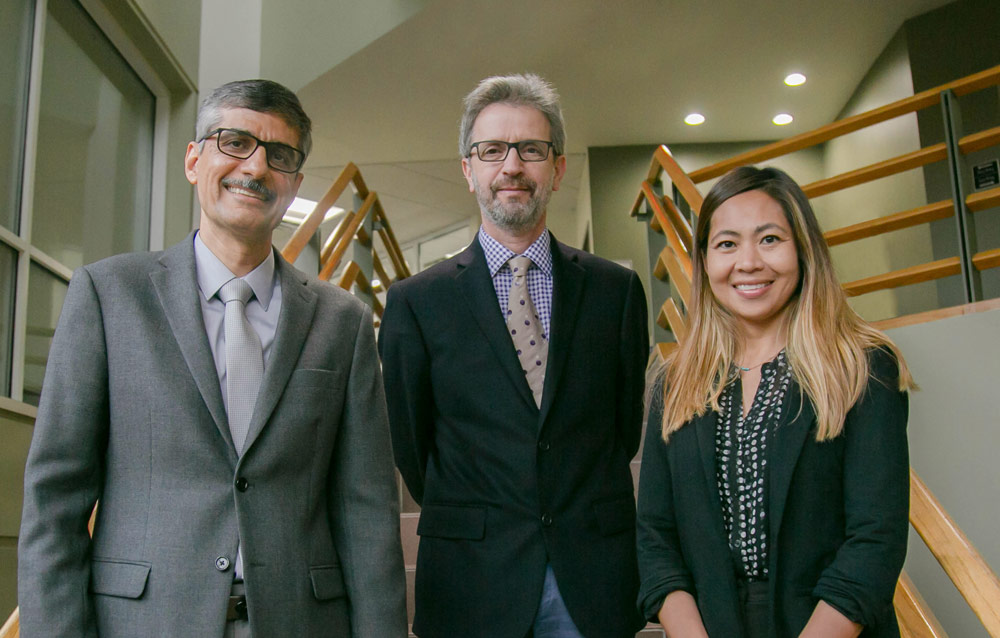
From left: Dr. Mehrdad Nourani, Dr. Stephen Spiro and Dr. Francesca Filbey have new roles as associate provosts at The University of Texas at Dallas. In addition to their research and teaching duties, the three professors oversee areas for University faculty and academic administrators for the Office of the Provost.
Dr. Inga Musselman, vice president for academic affairs and provost, is preparing for new initiatives to support the academic mission of The University of Texas at Dallas and has appointed three University professors to associate provost roles to help her accomplish those objectives.
Musselman has named Dr. Francesca Filbey, Dr. Mehrdad Nourani and Dr. Stephen Spiro as associate provosts, each working in the provost’s office half time, while continuing their research and teaching. Each has served in leadership roles in their respective schools.
“These are all very senior, accomplished, research-active faculty. To bring them in here full time would make it difficult for them to continue their research,” said Musselman, who holds the Cecil H. Green Distinguished Chair of Academic Leadership. “But by bringing them in half time, they can bring their expertise to help accomplish the academic mission of the University, while gaining experience. At the same time, they can stay connected to their units and keep their research programs moving forward.”

“By bringing them in half time, they can bring their expertise to help accomplish the academic mission of the University, while gaining experience. At the same time, they can stay connected to their units and keep their research programs moving forward.”
Dr. Inga Musselman, vice president for academic affairs and provost
Filbey, professor of cognitive neuroscience in the School of Behavioral and Brain Sciences, previously served as head of the cognition and neuroscience program in the school. In her associate provost role, she focuses on faculty tenure, promotion and annual reviews — ensuring that processes are implemented in accordance with University policies and guidelines.
“The review process can be very daunting for faculty under review, as well as for those conducting the review. My role is to facilitate each step along the way and protect the integrity of the review process,” said Filbey, who holds the Bert Moore Chair in BrainHealth. “It’s uplifting to be a part of faculty’s successes and career development.”
Nourani, professor of electrical engineering in the Erik Jonsson School of Engineering and Computer Science, oversees the academic administrator review process, as well as faculty institutional research. He previously served as head of the computer engineering program.
Nourani is developing a systematic process for reviewing academic administrators. As part of those responsibilities, he intends to streamline the process of collecting and reporting on faculty activity information. The annual reports submitted by faculty highlight their teaching, research and service activities. It’s a system he hopes to improve.
“All of this submitted information becomes a PDF file that is not easily searchable. I think, as a large academic institution, it is quite important to make it analyzable so we can quickly and accurately parse metrics by programs, departments, schools, or at the university level,” he said.
Spiro is the C.L. and Amelia A. Lundell Distinguished Professor of Life Sciences in the School of Natural Sciences and Mathematics and until recently was the head of the Department of Biological Sciences. He is charged with leading the University’s faculty hiring process, managing research space in interdisciplinary research facilities, and guiding the implementation of revised faculty workload policies.
“As department head, one of the things I enjoyed most was recruiting and then mentoring new faculty as they started their careers. So I’m excited to be involved in faculty recruitment campuswide,” Spiro said. “I also appreciate the opportunity to learn more about the institution and to make an impact on a larger scale, and to interact with colleagues across the University.”
A recent University of Texas System Board of Regents’ decision gives responsibility for faculty workload policies to the individual institutions, and Spiro is charged with facilitating the process to create and then implement the new UT Dallas faculty workload policies.
Musselman said she is pleased to have the new associate provosts in place, noting that their skills will further improve the academic climate on campus.
“All three are accomplished and respected,” she said. “I expect them to develop processes and build relationships that will continue to bolster UT Dallas’ reputation for innovation and academic leadership.”
About the Office of the Provost
The Office of the Provost promotes and pursues excellence in the University’s academic units, oversees all academic affairs units at UT Dallas and sponsors faculty hiring, faculty promotion and tenure, and all academic programs. As provost, Musselman provides oversight to the eight academic deans, the graduate and undergraduate deans, the dean of the Hobson Wildenthal Honors College, and other programs and units across campus, including the Center for Teaching and Learning, the International Center, the Eugene McDermott Scholars Program and the Eugene McDermott Library.